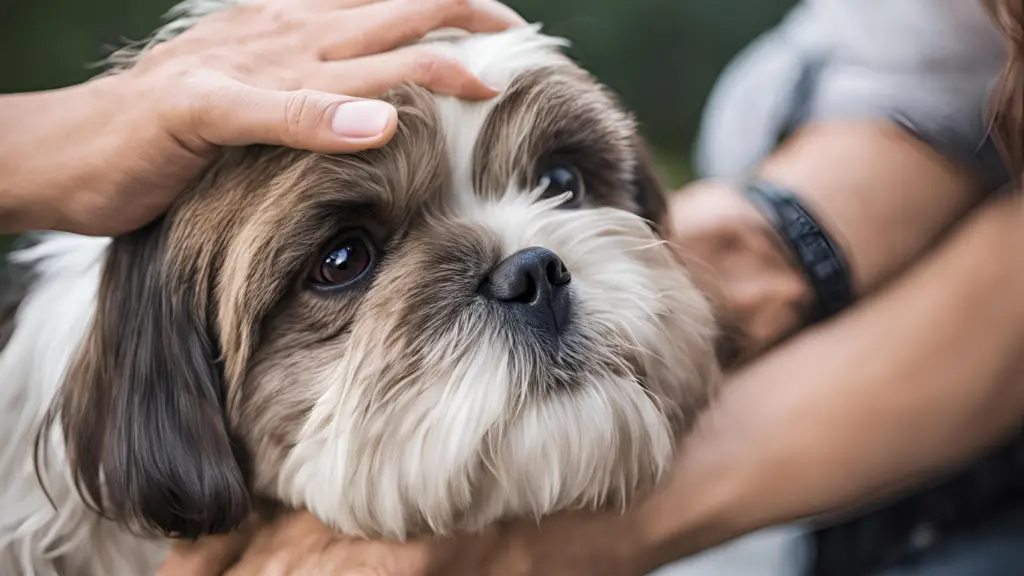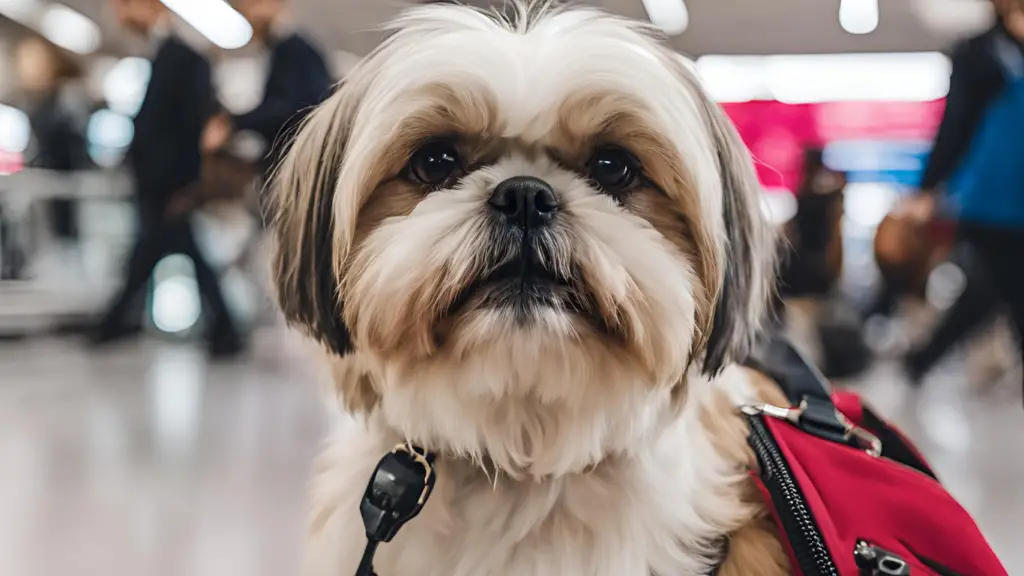
Shih Tzus are known for their affectionate and loyal nature, but this strong bond with their owners can sometimes lead to separation anxiety. This condition can manifest in various ways, from destructive behavior to excessive barking and distress. Understanding and addressing separation anxiety is crucial for ensuring your Shih Tzu remains happy and well-adjusted. This comprehensive guide will explore effective strategies for managing and alleviating separation anxiety in your Shih Tzu.
Understanding Shih Tzu Separation Anxiety

What is Separation Anxiety?
Separation anxiety is a behavioral condition where a dog experiences extreme distress when separated from their owner or primary caregiver. Shih Tzus, with their strong attachment to their families, are particularly susceptible to this condition. Signs of separation anxiety can include excessive barking, destructive behavior, and attempts to escape. Understanding these signs is the first step in addressing the problem effectively.

Symptoms of Separation Anxiety
Recognizing the symptoms of separation anxiety is crucial for timely intervention. Common signs include continuous barking or whining when left alone, destructive chewing on furniture or personal items, and house soiling. In more severe cases, Shih Tzus may exhibit excessive drooling, pacing, or attempts to escape from confinement. Monitoring these behaviors can help you identify if your Shih Tzu is suffering from separation anxiety.

Causes of Separation Anxiety
Several factors can contribute to the development of separation anxiety in Shih Tzus. Changes in their environment, such as moving to a new home or changes in the family structure, can trigger anxiety. Additionally, a lack of proper socialization, previous traumatic experiences, and a history of being left alone for extended periods can also contribute. Understanding the root causes can aid in developing effective strategies to alleviate the condition.
Building a Secure and Comfortable Environment

Create a Safe Space
Providing a secure and comfortable space for your Shih Tzu can help alleviate anxiety when you are not home. Designate a specific area in your home where your Shih Tzu feels safe, such as a cozy crate or a comfortable dog bed. Ensure this space is equipped with their favorite toys, blankets, and items that provide comfort. A safe space helps your Shih Tzu feel more secure and reduces anxiety when left alone.

Use Interactive Toys and Puzzles
Interactive toys and puzzles can help keep your Shih Tzu occupied and mentally stimulated while you are away. Provide toys that dispense treats or engage your Shih Tzu in problem-solving activities. These toys not only distract your dog but also provide mental stimulation, which can be particularly beneficial in reducing anxiety.
Comfort Items
Comfort items such as your Shih Tzu’s favorite blanket or a piece of your clothing can provide a sense of familiarity and security. These items carry your scent and can help soothe your dog when you are not around. Ensure these comfort items are accessible in their designated safe space to offer reassurance during your absence.
Gradual Desensitization Techniques

Practice Short Departures
Gradual desensitization involves teaching your Shih Tzu to cope with short periods of separation before increasing the duration. Start with brief absences and gradually extend the time as your Shih Tzu becomes more comfortable. This technique helps your dog learn that you will always return and reduces the anxiety associated with longer separations.
Positive Reinforcement
Positive reinforcement is key in helping your Shih Tzu associate your departures with positive experiences. Reward your Shih Tzu with treats and praise for calm behavior when you leave and return home. Avoid making a fuss during departures and arrivals, as this can increase anxiety. Consistent positive reinforcement helps your Shih Tzu develop confidence and trust in your return.

Desensitize to Departure Cues
Dogs often pick up on cues that indicate you are about to leave, such as picking up keys or putting on shoes. Gradually desensitize your Shih Tzu to these departure cues by practicing these actions without leaving. This helps reduce the anxiety associated with these signals and makes your departures less stressful for your dog.
Training and Behavioral Techniques
Teach Independence
Encouraging independence in your Shih Tzu can help reduce separation anxiety. Start by teaching your Shih Tzu to be comfortable alone in a different room while you are still at home. Gradually increase the distance and duration to build confidence in their ability to be alone. This training helps your Shih Tzu feel more secure and less reliant on your constant presence.

Obedience Training
Basic obedience training can provide structure and discipline, which can help alleviate separation anxiety. Teach your Shih Tzu essential commands such as “stay” and “sit” to improve their overall behavior. Consistent training reinforces good behavior and helps your Shih Tzu feel more secure and less anxious when left alone.
Avoid Negative Reinforcement
Avoid using negative reinforcement or punishment when addressing separation anxiety. Negative reinforcement can increase anxiety and worsen the problem. Instead, focus on positive reinforcement and rewarding calm behavior. This approach helps build trust and confidence in your Shih Tzu, reducing anxiety over time.
Professional Help and Support
Consult a Veterinarian
If your Shih Tzu’s separation anxiety is severe or persistent, consult a veterinarian for professional guidance. A veterinarian can help rule out any underlying health issues and provide recommendations for managing anxiety. In some cases, medication may be prescribed to help alleviate symptoms while you work on behavioral modifications.

Seek a Professional Dog Trainer
A professional dog trainer with experience in handling separation anxiety can provide valuable assistance. Trainers can offer personalized strategies and techniques tailored to your Shih Tzu’s needs. They can also help you implement effective training and behavioral modification plans to address separation anxiety.
Consider a Canine Behaviorist
A canine behaviorist specializes in addressing complex behavioral issues and can offer in-depth support for managing separation anxiety. Behaviorists can conduct a thorough assessment of your Shih Tzu’s behavior and develop a customized treatment plan. Their expertise can be particularly beneficial if standard training methods are not yielding the desired results.
Managing Separation Anxiety in Different Situations

Handling Work Absences
If you work long hours or have frequent absences, consider options for managing your Shih Tzu’s anxiety. Doggy daycare or pet-sitting services can provide companionship and reduce loneliness during your absence. Additionally, arranging for a trusted friend or family member to visit your Shih Tzu can help ease the transition and provide comfort.
Adjusting to New Environments
Moving to a new home or environment can trigger separation anxiety in Shih Tzus. Ensure a smooth transition by introducing your Shih Tzu to their new surroundings gradually. Set up their safe space and comfort items as soon as possible to help them adjust. Providing reassurance and maintaining a consistent routine can also help ease the adjustment period.

Dealing with Temporary Changes
Temporary changes such as vacations or short trips can also impact your Shih Tzu’s anxiety levels. Prepare your Shih Tzu by gradually increasing their time alone before your departure. Arrange for a familiar caregiver to look after them and maintain their routine to reduce stress. Consistent communication with the caregiver can help ensure your Shih Tzu’s needs are met while you are away.
Preventing Future Separation Anxiety
Early Socialization
Early socialization is key in preventing separation anxiety in Shih Tzus. Expose your puppy to various environments, people, and experiences from a young age. Positive socialization helps build confidence and reduces the likelihood of developing separation anxiety as they grow older.

Consistency and Routine
Maintaining a consistent routine helps your Shih Tzu feel secure and reduces anxiety. Establish regular feeding, exercise, and playtimes to create a predictable schedule. Consistency in daily routines provides stability and helps your Shih Tzu adjust to periods of separation more easily.
Continued Mental and Physical Stimulation
Ongoing mental and physical stimulation is crucial for your Shih Tzu’s overall well-being. Engage in regular play sessions, training exercises, and interactive toys to keep them mentally and physically active. A well-stimulated Shih Tzu is less likely to experience anxiety and more likely to handle separation periods with ease.

Conclusion
Handling Shih Tzu separation anxiety requires a comprehensive approach that includes understanding the condition, creating a secure environment, implementing gradual desensitization techniques, and seeking professional help if necessary. By following these strategies, you can help your Shih Tzu develop confidence and reduce anxiety during periods of separation. Consistent care, positive reinforcement, and attention to your Shih Tzu’s needs are essential for managing and overcoming separation anxiety. Remember, with patience and dedication, you can ensure your Shih Tzu remains happy and well-adjusted, even when you are not home.


